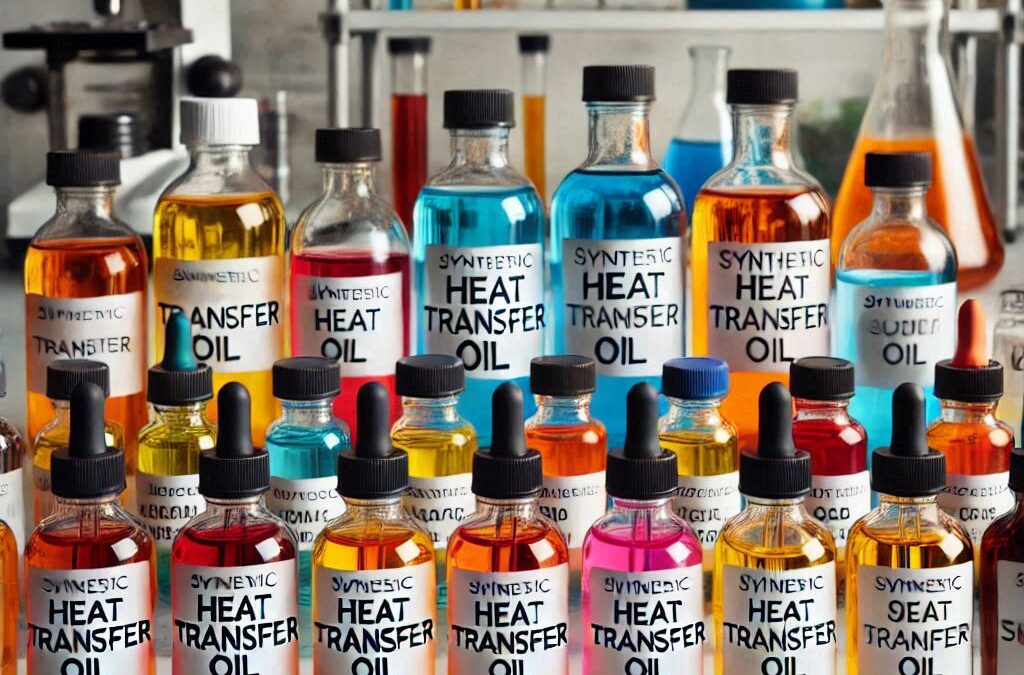Synthetic heat transfer oils are advanced thermal fluids specially engineered to perform in demanding environments where traditional mineral-based heat transfer oils fall short. These oils are tailored to provide superior thermal stability, efficiency, and safety, making them an ideal choice for systems operating under extreme temperature conditions.
Why Choose Synthetic Heat Transfer Oils?
In industrial applications where high-performance heat transfer is essential, synthetic oils excel in ensuring system reliability and efficiency. These oils are particularly suited for closed-circuit circulation systems that do not operate under excessive pressure and where the typical bulk oil temperature is around 385°C, with a maximum film temperature of 400°C on heating surfaces.
Key Advantages:
- Long-Lasting Durability
Synthetic heat transfer oils are designed for extended service life, reducing the frequency of fluid replacement and minimizing operational downtime. This leads to significant cost savings over time. - Superior Heat Transfer Coefficient
Their exceptional thermal conductivity ensures rapid and efficient heat transfer, enhancing system performance and reducing energy consumption. - Energy Efficiency
By optimizing heat transfer processes, these oils lower the energy requirements of the systems they operate in, contributing to reduced operating costs. - Outstanding Low-Temperature Fluidity
Synthetic oils retain excellent flow properties even at low temperatures, making them versatile for systems exposed to wide temperature ranges. - Non-Corrosive Nature
Unlike some fluids that can degrade and corrode system components, synthetic heat transfer oils are formulated to remain stable and non-corrosive to most metals and alloys, even at elevated temperatures. This feature significantly extends equipment life and reduces maintenance needs. - Safety Features
- Low Vapor Pressure: Minimizes the risk of ignition in the event of gas leakage, enhancing system safety.
- Thermal Stability: Withstands high temperatures without breaking down, ensuring consistent performance.
- Decomposition Management: Low-boiling-point decomposition products can be effectively removed from the system, preventing buildup and ensuring smooth operation.
Applications of Synthetic Heat Transfer Oils
Synthetic heat transfer oils are indispensable in industries where precise and efficient thermal management is critical, such as:
- Chemical Processing: Used in reactors, distillation columns, and heat exchangers to maintain controlled temperatures.
- Plastic and Rubber Manufacturing: Essential for molding processes, extrusion systems, and curing operations.
- Pharmaceutical Industry: Facilitates heating and cooling processes in production lines.
- Food Processing: Ensures consistent temperature control in baking, frying, and drying systems.
- Power Plants: Used in solar power systems and other energy generation setups requiring efficient thermal transfer.
Why Synthetic Over Mineral Oils?
While mineral-based heat transfer oils are suitable for many applications, they often degrade under extreme conditions, leading to reduced efficiency, increased maintenance, and higher costs. Synthetic oils, with their enhanced thermal properties and stability, provide a more reliable and economical solution for high-temperature operations.
Leading Brands of Synthetic Heat Transfer Oils
Industry leaders offer a range of synthetic heat transfer oils tailored for specific applications, ensuring you find the right product for your needs. Renowned manufacturers include:
- Dow
- Therminol®
- Shell Thermia
- Mobiltherm
Conclusion
Synthetic heat transfer oils are the backbone of thermal management in industries requiring superior performance and reliability. By investing in high-quality synthetic oils, you not only optimize system efficiency but also ensure long-term safety and sustainability. Choose synthetic heat transfer oils to elevate your system’s performance and lower operating costs.

